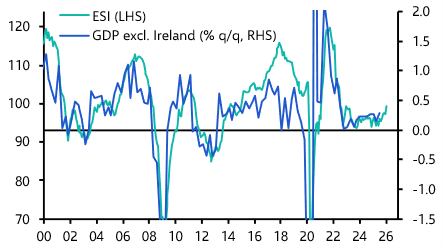Labour shortages in advanced economies are creating headaches for businesses and policy makers. But there's an argument that they end up spurring productivity, says Senior Economic Adviser Vicky Redwood in a new report. We asked Vicky about the productivity growth outlook, and what it could mean for expectations for monetary policy tightening.
Q: Vicky, global headlines are dominated by talk of labour shortages and rising inflation, but you’ve identified a potential silver lining. Could these shortages be a trigger for turning around productivity growth in advanced economies?
A: We typically think about productivity gains coming from increases in real wages, but history suggests it can occur the other way around – during the 1960s, for example. Our new report is intended to explain whether conditions are now present for a similar increase, and what this could mean for the debate around wage inflation and how monetary policy makers could respond.
Q: Boris Johnson has been a vocal proponent of this idea that firms can simply raise wages to get around their previous reliance on cheap labour from overseas. Is that a prescription for boosting productivity?
A: Not in isolation, no – raising wages won’t automatically boost productivity. That said, if conditions are right, rising wages could prompt firms to undertake the investment and changes in working practices that will raise productivity. Whether they do depends on things like whether firms perceive that labour shortages are permanent and if the more general investment environment is favourable. It also matters whether the shortages are concentrated in sectors where it’s relatively easy for firms to boost output without hiring more workers. This might be more possible in retailing than in hospitality, for example.
Q: You mentioned the appetite of firms to invest as a precondition for these shortages to boost productivity. What does the investment landscape look like?
A: The conditions certainly seem ripe: firms have amassed “excess” savings in the pandemic, our Financial Conditions Index suggests credit conditions are loose and banks seem willing to lend. On the demand side, surveys show corporate confidence is back. That said, there’s still considerable uncertainty around the outlook – the Omicron news is barely a week old, for example – and we’ve been explaining to clients how goods shortages are also acting as a brake on investment.
Q: Assuming there was this potential gain in productivity, your report goes on to show how it could offset any inflationary impact of wage increases. Would this give central banks less cause to raise rates?
A: Some of the changes that might boost productivity could happen quite quickly – such as adopting more efficient management practices. But others, such as developing better technology, could take longer to feed through to stronger productivity growth. So there’s a risk that any productivity uplift happens too late to stop central banks pulling the trigger on rate hikes to address this jump in wage inflation.
Q: Where are we most likely to see such productivity gains?
I’d say the US and UK, where labour shortages are most intense. Firms in those countries don’t expect these shortages to ease quickly. The US is one of the countries where the drop in the labour force is most likely to have been permanent. And in the UK, government policy has clearly shifted towards discouraging the use of cheap labour.
Read Vicky's report: 'Will labour shortages spur productivity gains?'
Related research
- This 2019 report laid out our case for increased productivity growth over the next decade.
- Conditions in the US are ripe for a big business equipment investment rebound, but firms are being held back by shortages and inflation.
- Our G7 Shortages Indicators dashboard on CE Interactive provides a real-time view of goods and labour shortages across advanced economies.



